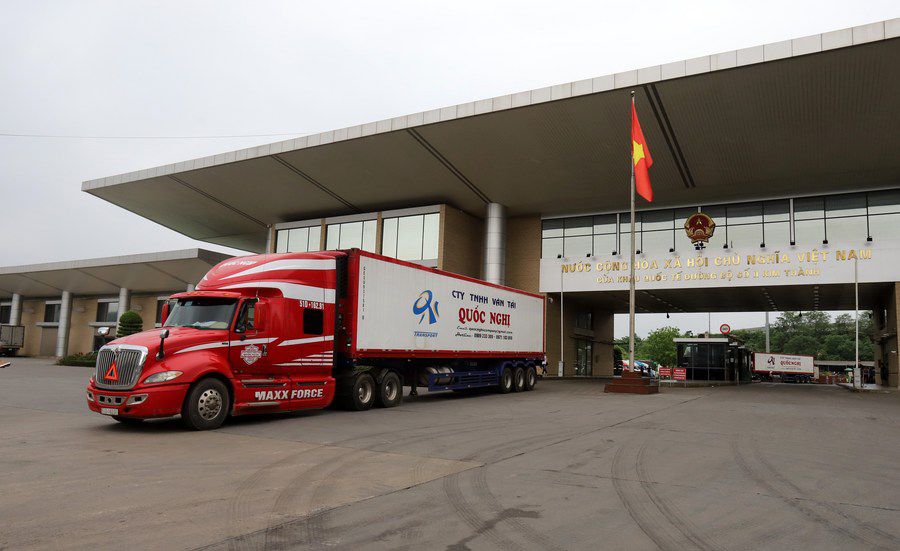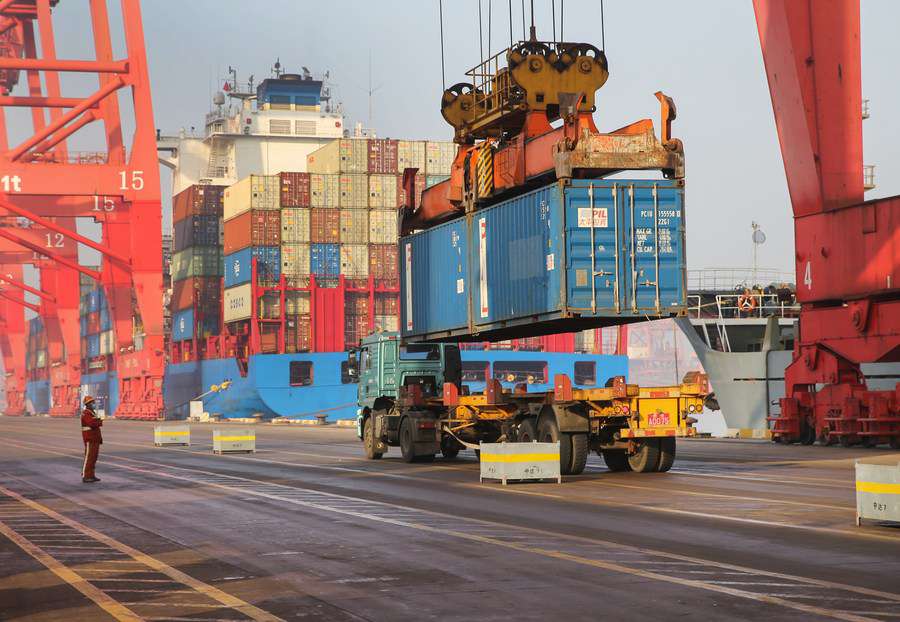


A container is transported on a truck at the container terminal of the Lianyungang Port in Lianyungang City, east China's Jiangsu Province, Jan. 14, 2021. (Photo by Wang Chun/Xinhua)
BEIJING, March 7 (Xinhua) -- China's foreign trade maintained upward momentum in the first two months of 2021, with exports posting strong performance, official data showed Sunday.
The country's total imports and exports of goods expanded 32.2 percent year on year to 5.44 trillion yuan (about 838.16 billion U.S. dollars) in the January-February period, according to the General Administration of Customs (GAC).
The growth rate is in a sharp contrast with a virus-induced slump of 9.7 percent during the same period a year earlier.
The substantial increase in foreign trade in the first two months was partly due to a low base last year, said GAC spokesperson Li Kuiwen. "Yet even compared with the same period in 2018 and 2019, China's foreign trade in the January-February period this year logged growth of about 20 percent."
Notably, export growth soared to 50.1 percent while imports rose 14.5 percent in yuan terms.

People visit an ancient cultural street in Tianjin, north China, Feb. 17, 2021, the last day of this year's Spring Festival holiday. (Photo by Sun Fanyue/Xinhua)
The fact that people chose to stay put over the Spring Festival holiday this year contributed to China's export boom, said Tu Xinquan, a professor at the University of International Business and Economics.
GAC surveys showed foreign trade companies in export-oriented provinces of Guangdong and Zhejiang managed to continue manufacturing activities during the week-long holiday as many workers followed the government's guidance to stay put to contain the spread of the virus, leading to an earlier-than-usual resumption of manufacturing sector.
China's strong foreign trade data also reflected booming overseas demand for Chinese products, said Tu.
The country saw double-digit growth in foreign trade volumes with major trading partners in the January-February period. The Association of Southeast Asian Nations remained China's largest trading partner during the period, with the combined trade volume rising 32.9 percent year on year.

Photo taken on May 27, 2020 shows a container truck carrying Vietnamese lychees exported to China at Kim Thanh II International Border Gate in Vietnam's northern Lao Cai province, which borders China.(VNA via Xinhua)
Other major trading partners such as the European Union, the United States and Japan saw trade volumes with China surge 39.8 percent, 69.6 percent and 27.4 percent, respectively.
China's foreign trade with countries along the Belt and Road amounted to 1.62 trillion yuan in the first two months, up 23.9 percent year on year.
The robust foreign trade data was in line with the Chinese economy's overall growth momentum. Official data showed the purchasing managers' index for China's manufacturing sector, a gauge measuring the vitality of manufacturing activities, remained in expansion zone for 12 consecutive months.
Companies showed increasing vitality and resilience. Imports and exports by private businesses stood at 2.57 trillion yuan during the same period, rising 49.5 percent year on year and accounting for 47.2 percent of the country's total, customs data showed.

Cargos are unloaded from a container ship at the container terminal of the Lianyungang Port in Lianyungang City, east China's Jiangsu Province, Jan. 14, 2021. (Photo by Wang Jianmin/Xinhua)
Some enterprises tended to be bullish about the outlook of foreign trade in the next few months, as they have stocked up on goods in advance, leading to increases in imports of integrated circuit, iron ore and crude oil, the GAC surveys showed.
Yet, maintaining steady growth of foreign trade will still be a tough task as instabilities and uncertainties in the global market remained and the COVID-19 pandemic continued to ravage the world, the GAC cautioned.
For instance, foreign trade companies in the short term need to tide over difficulties such as the price hikes of raw materials and shipping as well as the shortage of containers.
Efforts need to be made to push forward high-level opening-up, improve business environment for imports and exports, and facilitate new business models such as cross-border e-commerce, the GAC said.

 Award-winning photos show poverty reduction achievements in NE China's Jilin province
Award-winning photos show poverty reduction achievements in NE China's Jilin province People dance to greet advent of New Year in Ameiqituo Town, Guizhou
People dance to greet advent of New Year in Ameiqituo Town, Guizhou Fire brigade in Shanghai holds group wedding
Fire brigade in Shanghai holds group wedding Tourists enjoy ice sculptures in Datan Town, north China
Tourists enjoy ice sculptures in Datan Town, north China Sunset scenery of Dayan Pagoda in Xi'an
Sunset scenery of Dayan Pagoda in Xi'an Tourists have fun at scenic spot in Nanlong Town, NW China
Tourists have fun at scenic spot in Nanlong Town, NW China Harbin attracts tourists by making best use of ice in winter
Harbin attracts tourists by making best use of ice in winter In pics: FIS Alpine Ski Women's World Cup Slalom
In pics: FIS Alpine Ski Women's World Cup Slalom Black-necked cranes rest at reservoir in Lhunzhub County, Lhasa
Black-necked cranes rest at reservoir in Lhunzhub County, Lhasa China's FAST telescope will be available to foreign scientists in April
China's FAST telescope will be available to foreign scientists in April